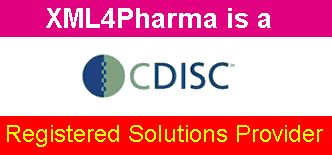

|
||||
| Home | Services | CDISC | Software | About us |

|
 |
Our new application server is now running ! Currently, the application server concentrates on providing demo applications to work with the CDISC set of standards and especially the ODM and Lab standard.
Currently following demo applications have been deployed:
PDF documents are used in many cases where the resulting document should be final, i.e. it should not be possible to change it afterwoods.
PDF documents can be generated on-the-fly, e.g. from database data or from XML documents. An example is the on-the-fly generation
of analytical certificates.
The application you can try out here allows you to submit a CDISC ODM file (v.1.1) and receive a full report in PDF format.
The setup of a study, i.e. which forms are used and what fields are on the forms (with the datatypes), are defined in the Study part of the CDISC ODM file.
The current application shows how eCRFs (in XForms format - the new standard for idiot-proof web forms) can be generated automatically from the Study
part of an ODM file. You can submit your own ODM file containing a study definition, and a set of eCRFs will be generated automatically.
You can then test these eCRFs on-line or download them.
New: When you use the generated eCRFs on-line, and do a submit after you filled in the form, the sumbitted data is
automatically transformed into CDISC ODM format, and shown to you.
A demo application showing the use of a native XML database containing approximately 3000 eCRFs in CDISC ODM format. You can query the database using XPath expressions. An XPath tutorial is included.
You can use the SOAP-based webservice to retrieve CDISC ODM files from our application server.
Until now, three methods have been deployed :
The simplest way for a central lab to generate CDISC Lab files is to do it using the ASCII implementation. For the receiving party however,
this has the disadvantage that checking the integrity and validity of the data is difficult. Transformation into CDISC Lab XML has the advantage
that validation becomes much easier, and that Lab files can be stored as XML or easily be transformed into ODM format.
The application allows you to convert CDISC Lab ASCII files into CDISC Lab XML files.
This application is also available as a stand-alone PC application against a small fee.
The CDISC ODM 1.2 standard provides a mechanism for electronically signing an ODM file (XML-Signature). However, in principle, each XML file can be provided
with an electronic signature, delivering authentication and integrity assurance at the same time.
This demo application allows you to sign your XML files (e.g. CDISC ODM) with a demo electronic signature (XML-Signature), and to verify the
validity of XML files that have already an electronic signature in XML-Signature format.
This tools checks CDISC Lab files (Base Model) against the CDISC Lab Standard. The checking goes considerably beyond a simple checking against
the XML-Schema: also issues that are described in the standard, but that could not be implememented in the Schema, are checked for.
An excellent tool to check whether your CDISC Lab files really comply !
Similar to the CDISCLabChecker XML, but now checking CDISC Lab files in ASCII format against the standard.

